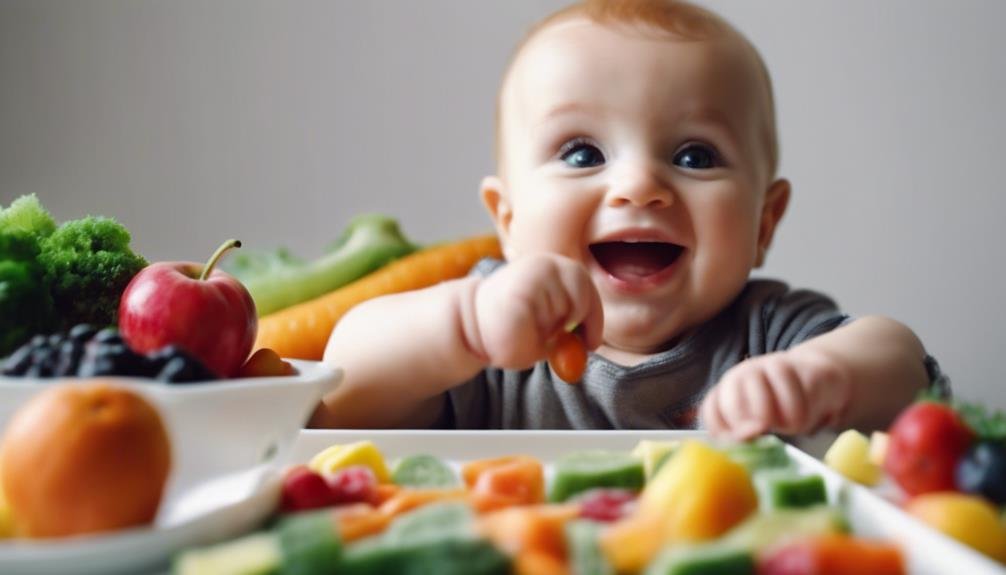"Cherishing Little Steps - A Haven for Baby and Family Journeys"
How to Introduce Solid Foods to Your 6-Month-Old
As you watch your little one curiously eyeing your plate, the time to introduce solid foods to your 6-month-old approaches. But how do you navigate this new culinary adventure smoothly and ensure your baby's nutritional needs are met without overwhelming their delicate system? Stay tuned to discover practical tips and guidance on introducing your baby to the world of solids, setting them on the path to a healthy eating journey.
Key Takeaways
- Start with easy-to-digest single-ingredient purees.
- Introduce a variety of fruits, vegetables, and proteins gradually.
- Watch for signs of allergies or digestive issues.
- Consult pediatrician for any concerns or reactions.
- Focus on establishing healthy eating habits early on.
Benefits of Introducing Solids Early

If you're wondering about the benefits of introducing solids early to your 6-month-old, you're on the right track towards providing them with essential nutrients for their growth and development. At this stage, your baby's iron stores from birth begin to deplete, making iron-rich foods like pureed meats, beans, or fortified cereals crucial to prevent deficiencies. Early introduction of solids can also help in the development of their taste buds and acceptance of a variety of flavors and textures, setting a foundation for healthy eating habits later in life.
Moreover, introducing solids can aid in your baby's overall growth and development by providing them with additional calories and nutrients not fully available in breastmilk or formula. This transition can also support the development of oral motor skills, essential for speech and proper chewing. Remember, each baby is unique, so it's important to monitor their responses and adjust accordingly to ensure a smooth and enjoyable introduction to solid foods.
Signs of Readiness for Solid Foods
When considering introducing solid foods to your 6-month-old, observe for specific signs indicating readiness for this transition. It's essential to look for cues that your baby is prepared to start exploring new tastes and textures.
Here are some key signs to watch for:
- Sitting Up Independently: If your baby can sit up without support, it's a good indicator that they may be ready for solid foods.
- Showing Interest in Food: Pay attention to your baby's reactions when you eat around them. If they seem curious or try to grab your food, they might be ready to give it a try themselves.
- Increased Appetite: If your baby seems unsatisfied after their regular milk feedings and is eager for more, it could be a sign that they're ready to start solids.
Choosing the Right First Foods

To select the most suitable first foods for your 6-month-old, consider their nutritional needs and developmental stage. At this stage, your baby needs foods that are easy to digest and rich in essential nutrients. Start with single-ingredient purees such as mashed bananas, sweet potatoes, or avocado. These foods are gentle on your baby's stomach and provide important vitamins and minerals for their growth.
Introducing foods one at a time can help you identify any potential allergies or sensitivities your baby may have. It's recommended to wait a few days before introducing a new food to observe any reactions. As your baby gets used to solids, you can gradually introduce a variety of fruits, vegetables, and eventually proteins like pureed chicken or lentils.
Remember to offer foods that are age-appropriate and suitable for your baby's stage of development. Avoid foods that pose a choking hazard, such as whole grapes or nuts. By choosing nutritious and safe first foods, you can support your baby's healthy growth and development.
Preparing Homemade Baby Food
Consider incorporating a variety of fruits, vegetables, and grains into your baby's diet by preparing homemade baby food. Making your own baby food can be a rewarding experience and ensures that your little one receives nutritious and fresh meals.
Here are some tips to help you get started:
- Choose Fresh Ingredients: Opt for fresh fruits and vegetables to maximize the nutritional value of the baby food.
- Steam or Bake: Steaming or baking fruits and vegetables helps retain their nutrients and natural flavors.
- Blend to the Right Consistency: Ensure that the homemade baby food is smooth and easily digestible for your 6-month-old.
Introducing Solids Gradually

Gradually introducing solids to your 6-month-old's diet is an important step in their transition to solid foods. Start by offering small amounts of a single type of food, such as pureed fruits or vegetables, once a day. This allows your baby to get used to the new textures and flavors without overwhelming their still-developing digestive system.
As your baby becomes more comfortable with eating solids, you can gradually increase the variety of foods and the number of times per day they're offered. Remember to watch for any signs of allergies or digestive issues, such as rashes, vomiting, or diarrhea.
It's normal for babies to take time to adjust to solid foods, so be patient and offer plenty of encouragement during meal times. Pay attention to your baby's cues and stop feeding them when they show signs of being full. By introducing solids gradually, you can help your little one develop healthy eating habits and enjoy a smooth transition to a solid food diet.
Handling Allergies and Reactions
Handling allergies and reactions involves closely monitoring your baby's response to new foods and being prepared to act swiftly if any adverse symptoms occur. It's essential to introduce one new food at a time and wait a few days before offering another to pinpoint any potential triggers.
Here are some key points to consider:
- Observe Closely: Watch for signs of allergies such as rashes, hives, vomiting, or diarrhea. Keep a food journal to track what your baby eats and any reactions that may occur.
- Consult Your Pediatrician: If you suspect an allergic reaction, seek medical advice immediately. Your pediatrician can provide guidance on how to proceed and may recommend allergy testing if needed.
- Be Prepared: Have age-appropriate antihistamines and know how to administer them in case of a severe allergic reaction. Always have emergency contact numbers on hand.
Establishing Healthy Eating Habits

To nurture a strong foundation for your 6-month-old's growth and development, focus on instilling healthy eating habits early on in their journey with solid foods. By introducing a variety of nutrient-rich foods, you can help your little one develop a taste for wholesome options and establish good eating practices for life. Encourage the consumption of fruits, vegetables, whole grains, and lean proteins to provide essential vitamins, minerals, and proteins necessary for their development.
Offering a diverse range of foods will also help your baby adapt to different tastes and textures, reducing the likelihood of picky eating habits in the future. Remember to lead by example and maintain a positive attitude towards food during mealtimes. Creating a calm and enjoyable eating environment can foster a healthy relationship with food and promote mindful eating practices.
As you navigate this exciting phase of introducing solids, remember that every baby is unique, and it's essential to be patient and flexible. Pay attention to your child's cues and preferences as you work together to establish healthy eating habits that will benefit them for years to come.
Frequently Asked Questions
Can I Mix Breast Milk or Formula With Solid Foods?
You can mix breast milk or formula with solid foods to help your baby transition smoothly. This gradual introduction can make the experience more enjoyable and nutritious for your little one as they explore new flavors and textures.
How Do I Store Homemade Baby Food?
Like treasures in a chest, store homemade baby food in airtight containers in the fridge for up to 3 days or freeze for longer freshness. Label with date and batch for easy organization.
Is It Normal for My Baby to Refuse Solids at First?
Totally normal for babies to refuse solids at first. It's a new experience for them! Be patient, keep offering, and don't stress. Your baby will adjust at their own pace. Trust the process.
When Should I Introduce Finger Foods to My Baby?
When should you introduce finger foods to your baby? Around 8-9 months, babies can start exploring finger foods. Offer soft, easy-to-grasp options like small pieces of fruit or cooked vegetables to encourage self-feeding and develop fine motor skills.
How Can I Tell if My Baby Is Getting Enough Nutrients From Solids?
To tell if your baby gets enough nutrients from solids, observe regular diaper changes, weight gain, and overall energy levels. Look for signs of satisfaction after meals and consult with your pediatrician for guidance.
Conclusion
Congratulations on successfully introducing solid foods to your 6-month-old!
Remember, the key to a lifetime of nutritious eating habits is starting early and introducing a variety of foods gradually.
Keep an eye out for any signs of allergies or digestive issues, and continue to offer age-appropriate and safe foods.
By laying a solid foundation now, you're setting your little one up for a healthy and happy future filled with delicious meals.
Keep up the great work!



My brother suggested I might like this website He was totally right This post actually made my day You cannt imagine just how much time I had spent for this information Thanks
ALAYINIZI SIKCEM RAHAT YOK SIZE
परिपक्व अश्लील देखो